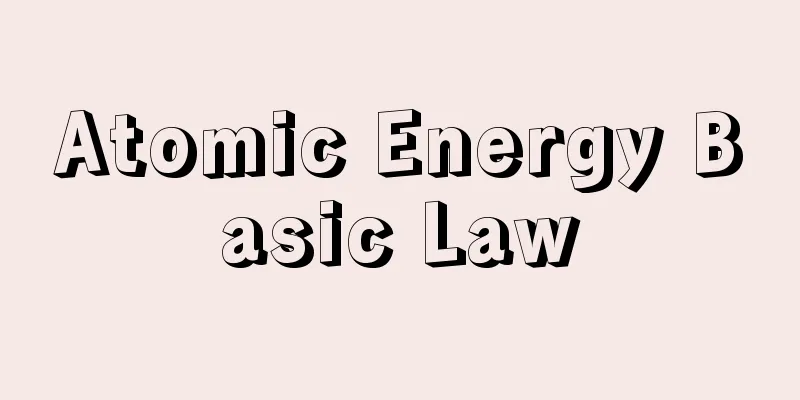Atomic Energy Basic Law

|
The Atomic Energy Basic Act is treated as the law that lays out the basic policy for the development and use of atomic energy in Japan and as the basis for various nuclear policies, and has been seen as the "Constitution of Atomic Energy." This Atomic Energy Basic Act was partially revised by the supplementary provisions of the "Nuclear Regulation Authority Establishment Act" that was promulgated on June 27, 2012. A clause was added regarding ensuring the safety of nuclear energy, stating that "the purpose is to contribute to the national security," which has sparked various speculations and debates. The "Committee of Seven Appealing for World Peace," founded by Hideki Yukawa and others, has called for the withdrawal of the proposed revision, stating that "it cannot be denied that this could pave the way for practical military use," and that "it will damage national interests and leave a legacy of disaster," and various media outlets have also raised doubts from various angles. The Atomic Energy Basic Law was enacted in December 1955 to regulate the research, development and use of atomic energy. Its purpose is to secure future energy resources, promote academic progress and industrial development by promoting the research, development and use of atomic energy, thereby contributing to the welfare of human society and the improvement of the standard of living of the people. It is based on the three principles of peaceful use of atomic energy, "openness, democracy and autonomy," which were set out by the Science Council of Japan in 1954. In addition to the purpose and basic policy of atomic energy use, the Atomic Energy Commission and Nuclear Safety Commission, nuclear development agencies, development and acquisition of minerals related to atomic energy, management of nuclear fuel materials, management of nuclear reactors, prevention of radiation damage, compensation, and other matters are based on the Atomic Energy Basic Law. In the wake of the Fukushima Daiichi Nuclear Power Plant accident in 2011, the integration and reorganization of the Nuclear and Industrial Safety Agency of the Ministry of Economy, Trade and Industry and the Nuclear Safety Commission of the Cabinet Office became an issue in order to eliminate the vertical division of administration in atomic energy. The government and the Democratic Party of Japan proposed the establishment of a new "Nuclear Regulation Agency" as an external bureau of the Ministry of the Environment. The opposition Liberal Democratic Party and Komeito Party proposed the establishment of a Nuclear Regulation Authority as a counterproposal. After three-party consultation in June 2012, the Act on Establishment of the Nuclear Regulation Authority was passed in the Diet. As a result, in line with the latter proposal, it was decided to launch the Nuclear Regulation Authority as an administrative commission with a certain degree of independence from the Cabinet, and to establish the Nuclear Regulation Agency as its secretariat. In the accompanying amendments to various laws, not only were the Atomic Energy Basic Act amended to include phrases such as the newly established Nuclear Regulation Authority, but also a clause that proclaims the peaceful use of nuclear power as the basic policy was amended to include a statement that the purpose of ensuring nuclear safety is to "contribute to national security." There have been a series of criticisms, including concerns about the intentional inclusion of clauses in the wake of the extremely serious accident at the Fukushima Daiichi Nuclear Power Plant, and the process of passing the bill in a short period of time with only three-party amendment consultations and without thorough Diet deliberations. (Writer Toshihide Kanaya / 2012) Atomic Energy Basic Act(Koshi Atsumi, Asahi Shimbun reporter / 2008) Source : "Chiezo" published by Asahi Shimbun Publications Co., Ltd. About Chiezo |
|
原子力基本法は日本の原子力開発利用の基本方針を定めるものとして、また原子力に関する諸施策の根拠法として扱われ、「原子力の憲法」という見方をされてきた。この原子力基本法が、2012年6月27日に公布された「原子力規制委員会設置法」の附則によって、部分的に改正される。このうち、原子力の安全の確保について「我が国の安全保障に資することを目的」とする項が追加され、様々な臆測と論議を呼んだ。湯川秀樹らが創設した「世界平和アピール七人委員会」は「実質的な軍事利用に道を開く可能性を否定できない」「国益を損ない、禍根を残す」と改正案の撤回を求め、報道各社も様々な角度から疑義を呈している。 原子力基本法は、原子力の研究、開発と利用について定めるものとして、1955年12月に制定。原子力の研究、開発及び利用を推進することによって、将来におけるエネルギー資源を確保し、学術の進歩と産業の振興とを図り、もって人類社会の福祉と国民生活の水準向上とに寄与することが目的。根幹には54年に日本学術会議が掲げた原子力平和利用三原則である「公開・民主・自主」を取り入れている。原子力基本法に基づいて、原子力利用の目的や基本方針のほか、原子力委員会及び原子力安全委員会、原子力の開発機関、原子力に関する鉱物の開発取得、核燃料物質の管理、原子炉の管理、放射線による障害の防止、補償などの事柄が根拠付けられる。2011年の福島第一原子力発電所事故を巡り、原子力における縦割り行政を排するものとして、経済産業省の原子力安全・保安院や内閣府の原子力安全委員会などの統合・改編が課題となった。政府・民主党は、環境省の外局として「原子力規制庁」を新設することを提唱。野党自民党、公明党は、対案として「原子力規制委員会」の設置を求めた。12年6月の3党協議を経て、「原子力規制委員会設置法」が国会で可決。この結果、後者の案に沿って、内閣から一定の独立性をもつ行政委員会として「原子力規制委員会」の発足が決まり、その事務局である「原子力規制庁」が設置される。これに伴う諸法の改正で、新設される「原子力規制委員会」などの語句について原子力基本法を改めるばかりでなく、原子力の基本方針である平和利用を謳う条文に、原子力の安全の確保について「安全保障に資することを目的」とするなどの文言が追加された。福島第一原子力発電所の極めて重大な事故にかこつけて、意図的な条文を盛り込むことへの懸念や、3党だけの修正協議だけで国会審議も尽くさず短時間で一気に成立させるという過程などへの批判が相次いでいる。 (金谷俊秀 ライター / 2012年) 原子力基本法(渥美好司 朝日新聞記者 / 2008年) 出典 (株)朝日新聞出版発行「知恵蔵」知恵蔵について 情報 |
<<: Nuclear disaster compensation
Recommend
Akaze
[ Decapterus muroadsi ]. A marine fish of the genu...
Hirsau (English spelling)
A small village with a population of about 2,000 i...
Hippasos
...Another name for the five regular polyhedrons ...
Arazzo - Arazzo
… Apart from Paris, the main centers of tapestry ...
Adversary Culture
…A subculture that is hostile and rebellious agai...
Şeyh Sait (English spelling) SeyhSait
In February 1925, the Kurds rebelled against Pres...
Space industry
...The aerospace industry originally developed as...
Mande-tan (English spelling)
The indigenous Africans are divided into four maj...
Kaizoji Temple
(Nada-ku, Kobe City, Hyogo Prefecture) A tourist a...
Vitellio
...a medieval optician. Also known as Vitellio. D...
Syneresis
…Pathological conditions are caused by retinal br...
lectus
...After the meal was over, the trapeza was store...
Reverse Lotus Pillar - Gyakurenchu
...Between the base and the girders, there are so...
Kolyma Mountains - Kolyma Mountains
A mountain range in the Magadan region of northeas...
Setsuro Ebashi - Setsuro Ebashi
Born: August 31, 1922, Tokyo [Died] July 17, 2006....









